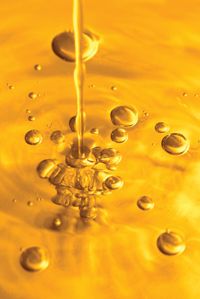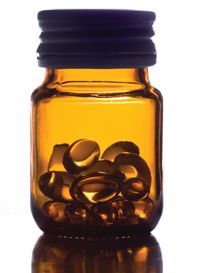Company News
Pharmachem Appoints New Distributor for Phase 2 in Japan DANISCO INTRODUCES LYSOMAX ENZYME
Pharmachem Appoints New Distributor for Phase 2 in Japan
DANISCO INTRODUCES LYSOMAX ENZYME

Danisco (Copenhagen, Denmark) is introducing a new enzyme called LysoMax for vegetable oil refiners. The enzyme is claimed to increase yield during refining and enable more-sustainable use of water and energy.
Vegetable oils commonly used in foods, such as soy and rapeseed, tend to be subject to fluctuations in supply and price on the commodities market. This means that users on the manufacturing side are eager to glean maximum use from their oil.
For refiners, the challenge is obtaining the maximum amount of oil during the refining process. Danisco says its new enzyme improves the release of vegetable oil from the gum, the viscous mass that is obtained when crude oil is treated with hot water.
The enzyme solution is added to the water during the first stage of refining the crudely pressed oil. As well as increasing the yield, the enzyme is said to reduce water use by 50%.
The company says the enzyme has no impact on the quality of the oil, and does not require the refiner to invest in any special equipment.
Pharmachem Laboratories Inc. (Kearny, NJ) announced that its Phase 2 Carb Controller ingredient (formerly known as Phaseolamin in Japan) will be distributed exclusively in Japan by Asahi Godo Inc. (Kyoto).
"Phase 2 Carb Controller is a best-selling carb-control ingredient, and Asahi Godo is going to take the ingredient to the next level of sales in Japan," said Mitch Skop, Pharmachem's director of new product development.
"Asahi Godo has a strong record of growth as a distributor of branded ingredients over the last decade. We believe it has the capability to help us reach our aggressive sales objectives for Phase 2," said Willy Tan, Pharmachem's Asia executive director of sales.
Capsugel Announces Pre- and Probiotic Combo
Capsugel (Peapack, NJ) has announced the launch of Pre-Pro Combo, a capsule designed to contain a combination of prebiotic and probiotic ingredients.
Utilizing its Moisture Defense System (MDS), which includes the use of capsule-in-a-capsule technology, the capsule offers natural products marketers the opportunity to enter the growing probiotic market "with an innovative edge," the company said.
"As the awareness of digestive health continues to grow, consumers are looking for nutritional products that can improve their digestive health," said Mark Vieceli, marketing manager for Capsugel. "Prebiotics and probiotics can work together to improve the ultimate nutritional effectiveness of probiotic ingredients. However, prebiotic regimens are less common because they are new to the market and more difficult to find on store shelves. The Pre-Pro Combo gives manufacturers a distinctive way to efficiently offer consumers additional benefits within one unique product."
The inner capsule of the Pre-Pro Combo contains a Lactobacillus acidophilus probiotic, which is then suspended in a liquid-based prebiotic formula containing fructo-oligosaccharide. Both capsules are composed of plant-based hypromellose (HPMC), and both are sealed with Capsugel's proprietary liquid encapsulation microspray sealing process.
The low moisture content of HPMC capsules, as well as the use of excipients with low water activity, ensures the presence of little moisture, the company said. "It acts like an internal desiccant, which means twice the protection from moisture from one innovative system," said Vieceli.
Lactalis Signs Deal with Martek
Lactalis Nutrition Sante (Torce, France) is the latest company to use Martek's (Columbia, MD) arachidonic acid (ARA) in infant formula and milk for young children, after signing a multiyear single-source agreement with the micro-algae specialist.
ARA is an omega-6 fatty acid that occurs naturally in human breast milk. It has been researched for its role in babies' mental and visual development. Martek's ARA is derived from Mortierella alpine and also contains longer-chain omega-3 EPA.
Known as Life's ARA, Martek's ingredient is already used in more than 95% of the infant formula sold in the United States that also include DHA omega-3, according to the company. Life's ARA has a presence in 75 countries worldwide.
The deal covers use of ARA in infant formulas and milk made by Lactalis and sold in France and Algeria.
Financial details and the precise length of the agreement were not disclosed, but the deal is a demonstration of Martek's international extension.
"Our partnership with Lactalis further demonstrates that companies worldwide understand the importance of adding Martek's ARA to infant formula for infant health and development," said Ethan Leonard, vice president of pediatric nutrition for Martek.
The World Health Organization (Geneva) recommends minimal consumption of 40 mg/day of ARA and 20 mg/day of DHA for infants.
Astaxanthin Launched in Softgel Capsules

In May, the Israeli company Algatechnologies launched 4-mg softgel astaxanthin capsules at the Vitafoods trade show in Geneva, Switzerland.
"Usually, we sell our astaxanthin in the form of oleoresin and beadlets to dietary supplement manufacturers," said Efrat Kat, marketing director. "But due to the increase in demand for our high-value AstaPure astaxanthin line from other manufacturers that cannot produce the necessary initial quantities of softgels themselves, we decided to provide it in capsules as well."
Kat said the company would not sell the capsules directly to consumers, but only to business partners centered in Europe, Asia Pacific, and the United States.
The global astaxanthin market is estimated at $260 million, with most astaxanthin on the market used in fish coloration.
New Supplement May Act as Sunscreen in Pill Form
Many people take a daily vitamin to keep their bodies healthy. But some supplements might improve their skin's health, too. The June 1 edition of the Los Angeles Times covered a supplement that claims to act as a sunscreen.
Heliocare capsules, manufactured by the company of the same name, contain 240 mg of an extract of Polypodium leucotomos, a tropical fern rich in antioxidant compounds such as caffeic acid and ferulic acid. Users are instructed to take one capsule every day with water or juice. Two capsules are recommended before heavy exposure to the sun.
The company's Web site says Heliocare is an "all natural oral antioxidant which helps protect against UV ray damage and aging." The fine print clarifies that "it is not a sunscreen and should be used in addition to topical skin protection."
"No supplement could ever replace the need for sunscreen, but the idea of sun protection in a pill isn't as far-fetched as it may sound," says John Murray, MD, a professor of medicine in the dermatology department at Duke University School of Medicine in Durham, NC.
Stevia Begins to Sweeten Europe
Manufacturers in France are gearing up to start using high-purity stevia extract, Reb A.
The European Food Safety Authority (EFSA; Parma, Italy) has received three petitions for stevia sweeteners. These petitions come from the European Stevia Association (EUSTAS), Cargill (Minnetonka, MN), and Merisant (Chicago). The organizations are hoping that pending a positive opinion from EFSA, extracts with 95% steviol glycosides could be approved in Europe under the new sweeteners directive by autumn 2010.
But in the meantime, manufacturers are allowed to authorize a new sweetener under transition arrangements. An arrangement that lasts two years, this is the route that France is taking in order to speed the sweetener's advent to the European market. By the time that the two-year period is up, companies expect that the European Union will have granted its seal of approval.
France's own food safety agency, AFFSA, cleared use of 97%-purity Reb A earlier this year. Ministerial authorization is anticipated this summer.
Angus Flood, head of international marketing at stevia manufacturing firm PureCircle (Florham Park, NJ), said, "The indications from the food and beverage industry in France are that they are more advanced in product development terms than Australia was in advance of regulatory approval."
He predicts, "We are expecting significant launches across several food applications, as soon as Reb A is approved in France."
New launches are expected to include Stevia sweeteners. This is as European food and beverage firms are looking for ways to make their products healthier for consumers.
Flood added that Turkey has already approved stevia extract. However, "we are clarifying the exact nature of the authorization," he said.
Florence Berglund of Granular (Bromma, Sweden) said that the early approval in France is mostly a good thing, as "major food and beverage makers are ready."